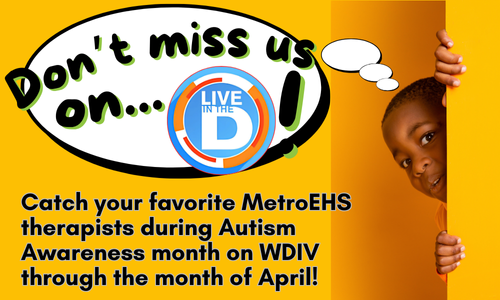3 Benefits of Teletherapy
3 things I’ve learned as my family and I started navigating the new present norm of a virtual world that caused me to see the benefits of virtual systems like Teletherapy. The 3 characteristics I learned are familiarity, relationships & continuity. Due to the new norm, my sophomore college age daughter had to move back … Continue reading
Teletherapy Offers Options & Opportunity
Your child has made great progress with in-person Pediatric Therapy. Then for a variety of reasons, you can’t make it to a therapy center for your child’s next face-to-face session. Teletherapy offers both options and opportunity. Teletherapy, or TelePractice, uses a HIPPA compliant and secure video platform, similar to Skype, to connect a client to … Continue reading
Nothing is Impossible
Sophia, a behavior technician at MetroEHS Pediatric Therapy, helps her young clients by focusing on communication skills, social skills and motor skills. As a priority and goal, Sophia is passionate about seeing her clients become more independent. Sophia is proud of the team of people around her at MetroEHS as they all work together to … Continue reading
MetroEHS Pediatric Therapy & Challenge Detroit
Challenge Detroit was founded in 2008, with a mission that reads; “We develop, support and connect emerging and existing community-minded leaders, amplifying the positive impact on our diverse, cultural vibrant city.” Challenge Detroit is making a difference. MetroEHS Pediatric Therapy is proud to be a host company with Challenge Detroit. MetroEHS is excited to introduce … Continue reading
Improvements Ahead!
Behind the Scenes Tour of Saline Therapy Center Allie one of the talented MetroEHS Speech Therapists gives a behind-the-scenes look at the build out of the Saline Therapy Center. A new ABA Therapy room includes some new tables, new windows and almost ready for kids as soon as new floors are installed. Allie is most … Continue reading
What Does Pediatric Feeding Treatment Look Like?
Once a child has been diagnosed with a Pediatric Feeding Disorder due to oral dysphagia or sensory processing disorder or, if diagnosed by a psychologist, ARFID (Avoidant/Restrictive Food Intake Disorder), they will likely be referred for treatment. Eating is a learned behavior. It is only instinctive for the first 6 months of life. Older children … Continue reading



